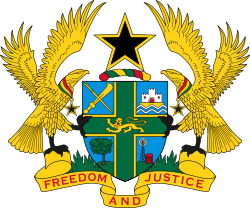 | |
| Agency overview | |
|---|---|
| Formed | 2009 |
| Jurisdiction | Republic of Ghana |
| Headquarters | |
| Minister responsible | |
| Website | www |
 |
|---|
| Constitution |
The Ministry of Transport (MoT) of Ghana was created in January 2009. [1] The ministry is responsible for the infrastructural development and service delivery in Ghana's transport industry.